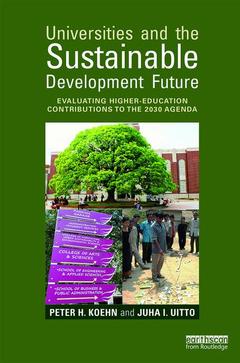Description
Universities and the Sustainable Development Future
Evaluating Higher-Education Contributions to the 2030 Agenda
Authors: Koehn Peter H., Uitto Juha I.
Language: English
Subjects for Universities and the Sustainable Development Future:
Keywords
Sustainable Development Evaluation; higher education; University Sustainable Development Evaluation; THEPs; Research Capacity Building Initiatives; university financial sustainability; Vice Versa; unversity education; Evaluation Capacity Development; estate management; NAAL; international development; University Sustainable Development; higher education institutions; Public Engagement; 2030 sustainable development agenda; Sustainable Development Future; university evaluation practices; Sustainable Development Undertakings; AUA; National Academy; Sustainable Development Challenge; UN; Sustainable Development Outcomes; TC; Sustainable Development Initiatives; International Development Evaluation; TSD; Participatory Evaluation; Curriculum Transformation; Sustainable Development Activity; Sustainable Development; Higher Education Rankings; Boundary Partners
Publication date: 04-2017
· 15.6x23.4 cm · Paperback
Publication date: 04-2017
· 15.6x23.4 cm · Hardback
Description
/li>Contents
/li>Readership
/li>Biography
/li>
Since the mid-1970s, a series of international declarations that link environment and sustainable development to all aspects of higher learning have been endorsed and signed by universities around the world. Although university involvement in sustainable-development research and outreach has increased substantially, systematic learning from higher-education engagements has been limited.
Universities and the Sustainable Development Future offers institutions of higher learning around the world practical guidelines that can be applied contextually to produce credible evidence regarding the outcome and impact of their teaching, research, and transnational-partnering activities. Drawing on innovative applications of lessons from experience with international-development cooperation, this book demonstrates the utility of a flexible framework that will inspire substantial improvements in the ways universities evaluate and improve their sustainable-development undertakings aimed at promoting Agenda 2030.
This book promotes an inclusive evaluation framework that will allow universities to illuminate sustainable-development outcomes, and it provides a cutting-edge resource for students, scholars, and policy makers with an interest in sustainable development, climate change, and evaluation challenges.
Introduction
Part I The Role of Today's Universities in Advancing Sustainable Development
Chapter 1: Conceptual Framework for Understanding University Engagement in Sustainable Development
Chapter 2: Contemporary Sustainability Expectations and Challenges for Higher Education
Part II Universities and Sustainable-Development Evaluations Chapter 3: A Review of Higher Education Sustainable-development-evaluation Practices
Chapter 4: The State of Higher Education Sustainable-development Evaluation: Limitations and Opportunities
Part III Framework for Enchanced University Sustainable-Development Evaluations
Chapter 5: Evaluations that Matter: Universities and Sustainable-development Transitions
Chapter 6: Curricular Evaluations that Matter
Chapter 7: Research Evaluations that Matter
Chapter 8: Outreach Evaluations that Matter
Chapter 9: Evaluating Transnational Higher-education Partnerships for Sustainable Development
Chapter 10: Enhancing Agenda-2030-Evaluation Capacity at Northern and Southern Universities
Part IV Sustainable Development and Enhanced University Process, Outcome and Impact Evaluations
Chapter 11: Practical Guidelines for Utilizing the Sustainable-development-evaluation Framework
Chapter 12: Conclusion: Evaluation and Higher-Education Contributions to the 2030 Agenda
Conclusion: Universities, Evaluation, and the 2030 Agenda
Dr. Peter H. Koehn is Professor of Political Science, a University of Montana Distinguished Scholar, a Fulbright New Century Scholar, and recipient of the Association of Public and Land Grant Universities (APLU)’s 2011 Michael P. Malone award for international leadership and the 2012 George M. Dennison Presidential Faculty Award for Distinguished Accomplishment. Over the course of his career, he has taught and conducted research in Ethiopia, Nigeria, Eritrea, Namibia, China, Hong Kong, and Finland. From 1991 through 1996, he co-directed a USAID University Development Linkage Project designed to strengthen the capacity of The University College of Belize to contribute to the sustainable development of Belize, particularly in natural-resource management. Professor Koehn is the founding director of The University of Montana’s Office of International Programs and its academic programs in International Development Studies and Global Public Health. His most recent book is China Confronts Climate Change: A Bottom-up Perspective (Routledge Advances in Climate Change Research Series, 2016). A full CV and list of publications can be found at www.cas.umt.edu/polsci/koehn/
Dr. Juha I. Uitto is Director of the Independent Evaluation Office of the Global Environment Facility (GEF). Since 1999, he has held various evaluation positions with the GEF and the United Nations Development Programme (UNDP), and conducted and managed a large number of programmatic and thematic evaluations of international cooperation at the global, regional, and country levels. Dr. Uitto spent the 1990s in the United Nations University coordinating the university’s environment and sustainable-development research and training programs. His earlier work has included positions in the Nordic Africa Institute and the International Fund for Agricultural Development (IFAD). He was educated at the Universities of Helsinki and Lund. Dr. Uitto ha
These books may interest you

Transformative Approaches to Sustainable Development at UniversitiesWorking Across Disciplines 158.24 €



